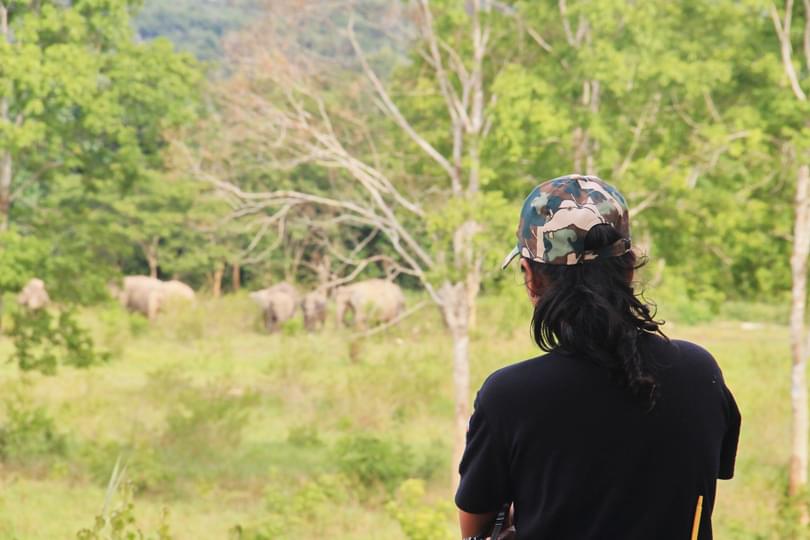
What is the right thing to do? In the context of conservation the answer always requires evidence, generally from both natural and social sciences. But as evidence builds into knowledge, deciding what to do requires something more: judgment and, hopefully, wisdom.
It is because of our determination to incorporate this ethical dimension that the University of Oxford's Wildlife Conservation Research Unit (WildCRU) is delighted to welcome, this week, Dr John Vucetich, a leading conservation ethicist now joining WildCRU as an Oxford Martin School Fellow under our Natural Governance Programme.
We have been working with John for the last year and this week Biological Conservation published our article on the challenges of discovering conservation outcomes that are also socially just.
Conservation professionals sometimes find themselves uneasy or unprepared when plunged into discussions about social justice. Examples easily come to mind: hard-working citizens of modest means no longer allowed to harvest forests on their property for the sake of some rare species of bird. In another case, protecting a rare ecosystem – a mangrove, for example – is gained by the cost of dislocating citizens. In yet another instance, mangrove protection may be accompanied by claims of unfairly infringing on the livelihood of a land developer. Conservation is increasingly stymied by people who object to particular conservation actions – claiming them to be unfair for one reason or another.
An important response to this problem has been the growth of what is sometimes called the collaborative governance of natural resources. The centrepiece of such governance is the convening of stakeholders to negotiate a settlement about the use of natural resources. These modes of governance are often celebrated as a positive alternative to more imposing forms of governance, where a government agency simply decides how to manage the natural resource in question.
Last year, John visited WildCRU and together with Dawn Burnham, Ewan Macdonald and myself began working on this problem. As the year passed we were fortunate to recruit others to the team, including social scientists from three continents. Our new paper explains what happens when we gaze at those modes of governance through the lens of environmental ethics and social justice.
We began by taking social justice to be the fair treatment of others judged according three principles: equality, need, and desert (noun form of deserve). When that and other ideas of social justice are synthesized with ideas from environmental ethics the result is aptly call the non-anthropocentric principle: No human should infringe on the well-being of others any more than is necessary for a healthy, meaningful life. The “others” in this principle is anyone entitled to fair treatment, including humans and many nonhumans elements of nature.
Extensive scholarship indicates that the notion “healthy, meaningful life” is readily analyzable through objective reasoning. Although the non-anthropocentric principle is unequivocally non-anthropocentric, it nonetheless prioritizes human well-being. In this sense, the principle cannot possibly be construed as misanthropic and is no more than minimally just toward non-humans. While the principle is broadly adaptable, it is not vacuous. We think it is helpful to have a guiding principle, just as in a court case a judge turns to the Law for guidance, and we think application of this principle in the governance of natural resources would be helpful. It would also be a radical departure from current practice.
John Vucetich and the team also consider several general scenarios, where a conservation action would cause either: a group to abandon a traditional cultural activity; financial loss to some human stakeholders; or an involuntary loss of employment. Considering these scenarios along with the three pillars of social justice – need, equality, and desert – results in additional guidance necessary for sighting the intersection of values that satisfy both conservation and social justice. It is guidance that tends to be overlooked in collaborative governance of natural resources.
Justice is widely appreciated to depend on both outcomes and procedures – i.e., principles against which outcomes are judged as well as procedures employed in arriving to some outcome. Collaborative governance is valuable for being especially focused on procedural justice. Ultimately what Vucetich et al. call for is counterbalance by duly attending value-laden principles against which outcomes are judged – principles representing the values of conservation and social justice.
Our paper is a formal, argument analysis intended to help conservation professionals striving to secure the future of wildlife while mindful of the well-being of people, and wrestling with the question, what is the right thing to do.
Vucetich JA, D Burnham, EA Macdonald, JT Bruskotter, S Marchini, A Zimmermann, DW Macdonald. 2018. Just conservation: what is it and should we pursue it? Biological Conservation.
This blog originally appeared on the WildCRU website on 26 February 2018.
This opinion piece reflects the views of the author, and does not necessarily reflect the position of the Oxford Martin School or the University of Oxford. Any errors or omissions are those of the author.
